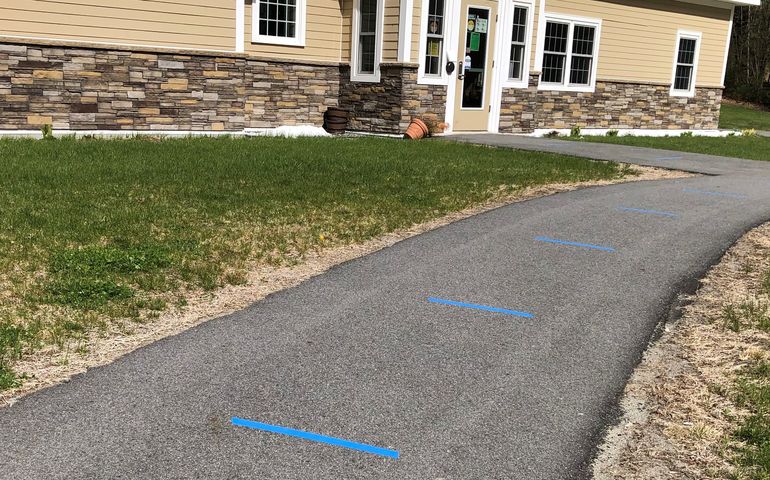Nearly 100 towns and cities across the state will share $9 million in grants to support public health programs fighting COVID-19 as businesses open and summer visitors pour into communities.
The grants are part of the Keep Maine Healthy Program announced earlier this month by Gov. Janet Mills, which includes support for community health education and restriction enforcement. The Department of Health and Human Services has approved plans submitted by 96 towns and cities, according to a news release from Mills.
A total of $13 million has been put aside for the program, using money from the state’s $1.25 billion in federal CARES Act relief. The funding is overseen by the Maine Center for Disease Control and Prevention, which is under the DHHS umbrella. The grants reimburse costs associated with approved public health education and prevention activities from June 8 through Oct. 31.
The Mills administration worked with the Maine Municipal Association and the Maine Mayors’ Coalition on the creation of the municipal grants program, and DHHS is considering a second round of grant funding for municipalities and expects to release further guidance soon, the release said.
Mills said the state’s towns and cities are on the front lines of responding to COVID-19, which positions them to protect both residents and visitors.
“Maine continues to have relatively low case counts, which is a product of our collective efforts, but as we reopen the vast majority of our economy, as more people interact, and as more visitors arrive from out-of-state, the likelihood of the virus spreading also increases,” she said.
“These awards are a deliberate effort to help mitigate that danger by helping municipalities implement measures that will protect the health of both residents and visitors alike.”
An incentive to develop COVID-19 plans
Stephen W. Gove, executive director of Maine Municipal Association, said the funding recognizes the vital front-line role cities and towns play. “This financial support is particularly important and welcomed during our summer tourist season,” he said.
The funding reimburses municipal costs associated with public health education and prevention, incentivizing municipalities and tribal governments to develop and implement their own COVID-19 prevention, education and protection plans, the release said.
The money can be used for:
- Public education activities. This could include printing and posting COVID-19 prevention information and developing local educational activities consistent with CDC guidelines, with staff time for planning and education activities and costs for signs materials, website development, brochures and mailing all reimbursable.
- Physical distancing and public health support. This could include fences, tape and signs for physical distancing in public spaces and closed streets; providing staff to limit crowds in front of restaurants, bars, beaches and other sites; new traffic pattern signs and education; buying personal protective equipment and hand sanitizer for staff, visitors, and for use at public locations; extra cleaning supplies and additional staff time required for enhanced public space and restroom cleaning and management, and more.
- Local business assistance. Staff time for code enforcement and local health officers who would educate businesses on best practices, follow-up on public complaints, report to sate officials when there is a potential public health violation that cannot be quickly resolved through educational means, etc.
Plans from Kittery to Bangor
The municipal programs vary in size and scope, the release said.
Kittery was awarded $248,906 for a comprehensive campaign to promote and support public health measures among residents, businesses and visitors, including providing additional contact-free services in public spaces such as parks, marinas and municipal buildings.
The grant will support educational materials and training, sanitation supplies, hiring seasonal code enforcement staff to assist with inspections, response to complaints and random compliance checks of physical distancing, occupancy and sanitation at businesses.
“The Keep Maine Healthy Program will support Kittery’s efforts to help our residents, businesses and visitors stay safe through the summer and fall seasons,” said Kendra Amaral, Kittery town manager.
Bangor was awarded $157,957 to promote the “Mask Up for Me” campaign and other public health and business support efforts, including promoting outdoor dining at restaurants.
“We are grateful to the governor and state officials for recognizing the tremendous work that the city of Bangor and its partners have been undertaking to educate residents and businesses on how to remain safe throughout the COVID pandemic,” said Bangor City Manager Cathy Conlow. She said she hopes the expanded efforts will help maintain community resilience throughout the COVID crisis.
Bar Harbor was awarded $127,000 for its campaign to support public health best practices, including improved signage, public kiosks with free facial coverings and sanitizer for visitor use, and a “Parklet Program” to support efforts to bring indoor businesses outside.
Earlier this week, the Mills administration also announced that it is dedicating $35 million in coronavirus relief funding to help local and tribal governments and other qualified entities cover costs incurred as a result of COVID-19.
The Federal Emergency Management Agency traditionally provides 75% reimbursement of disaster costs, with a 15% state match and 10% local match. Mills said that the state will use federal CARES Act money to cover the local portion for municipalities with stretched budgets because of COVID-19.
